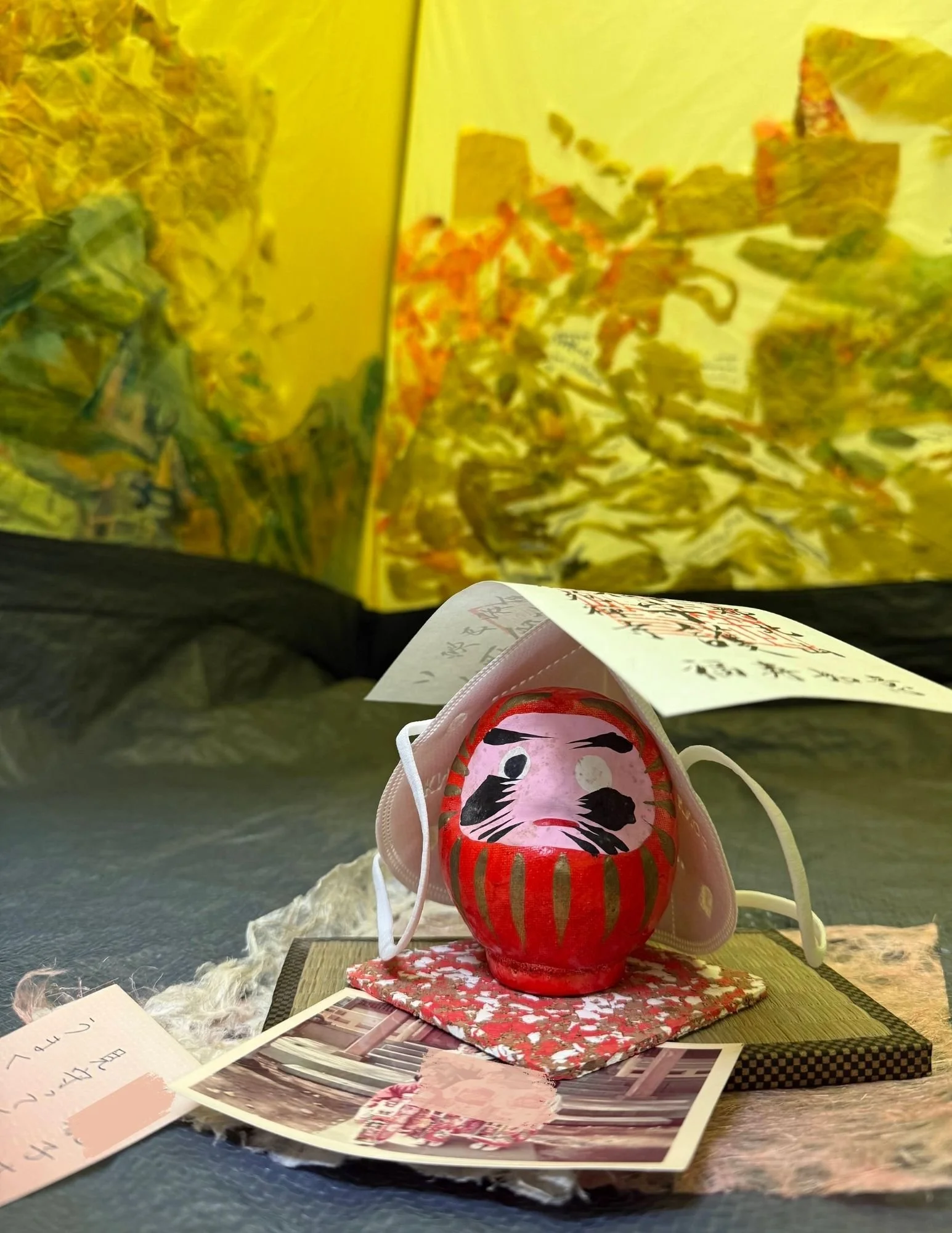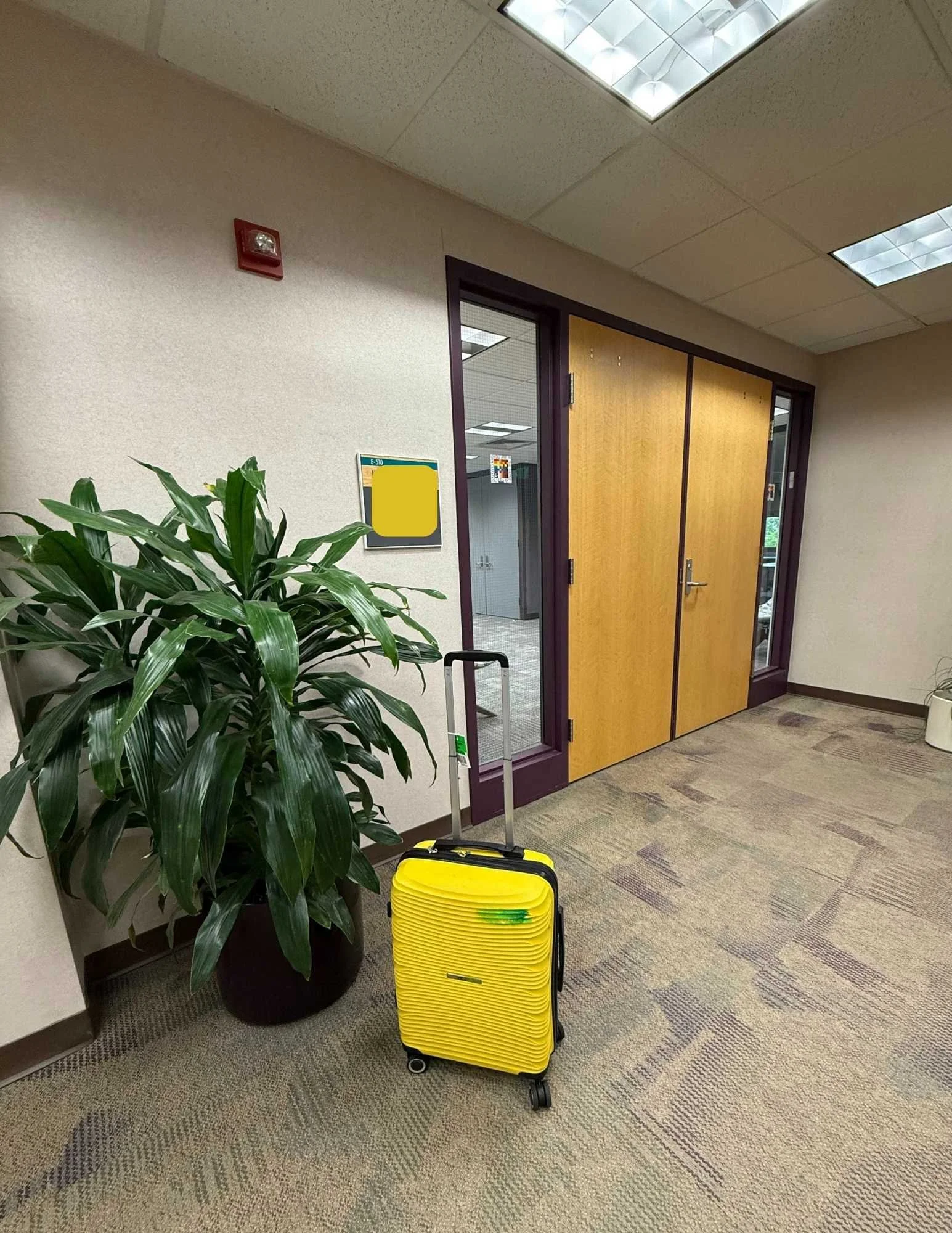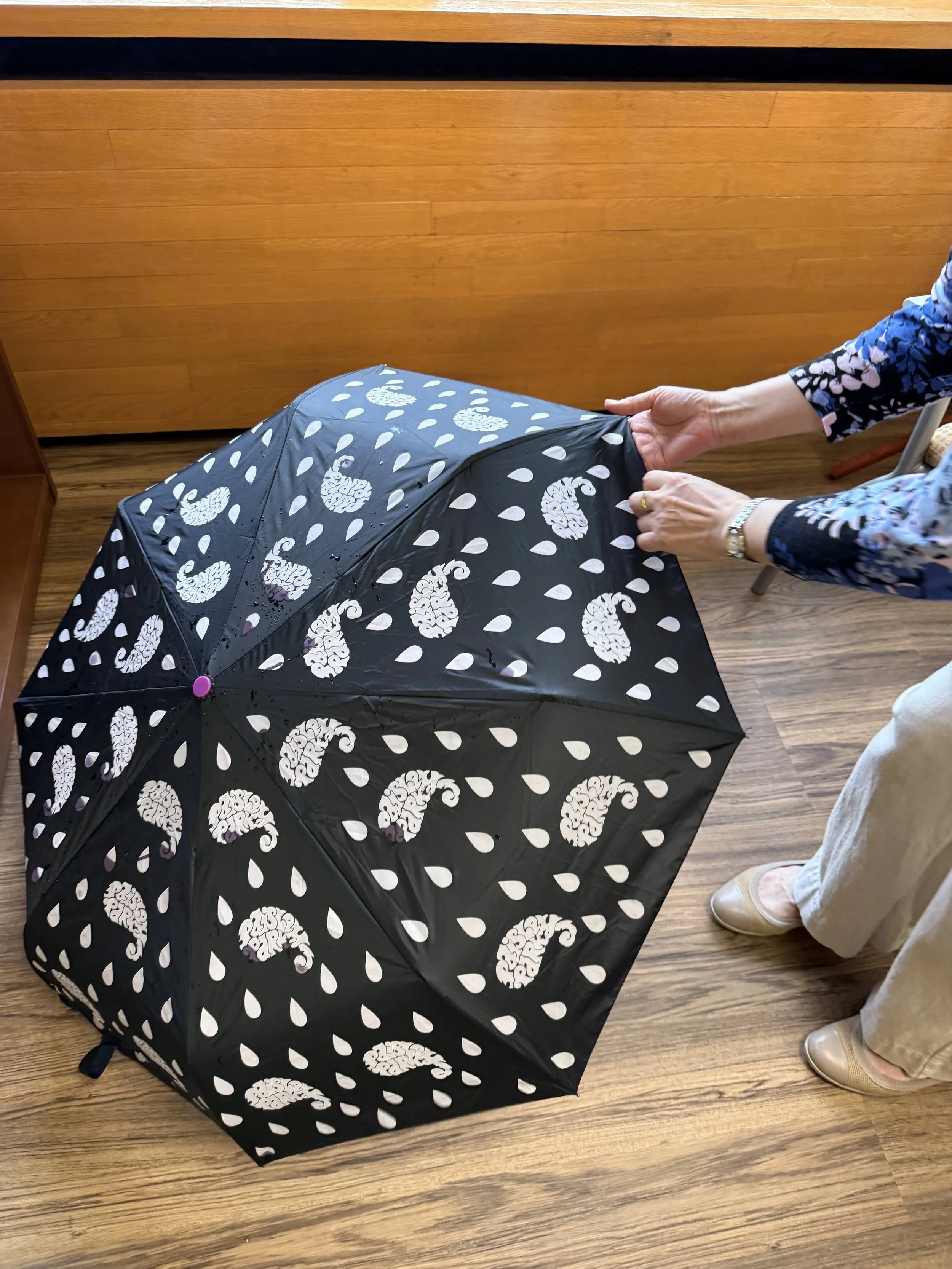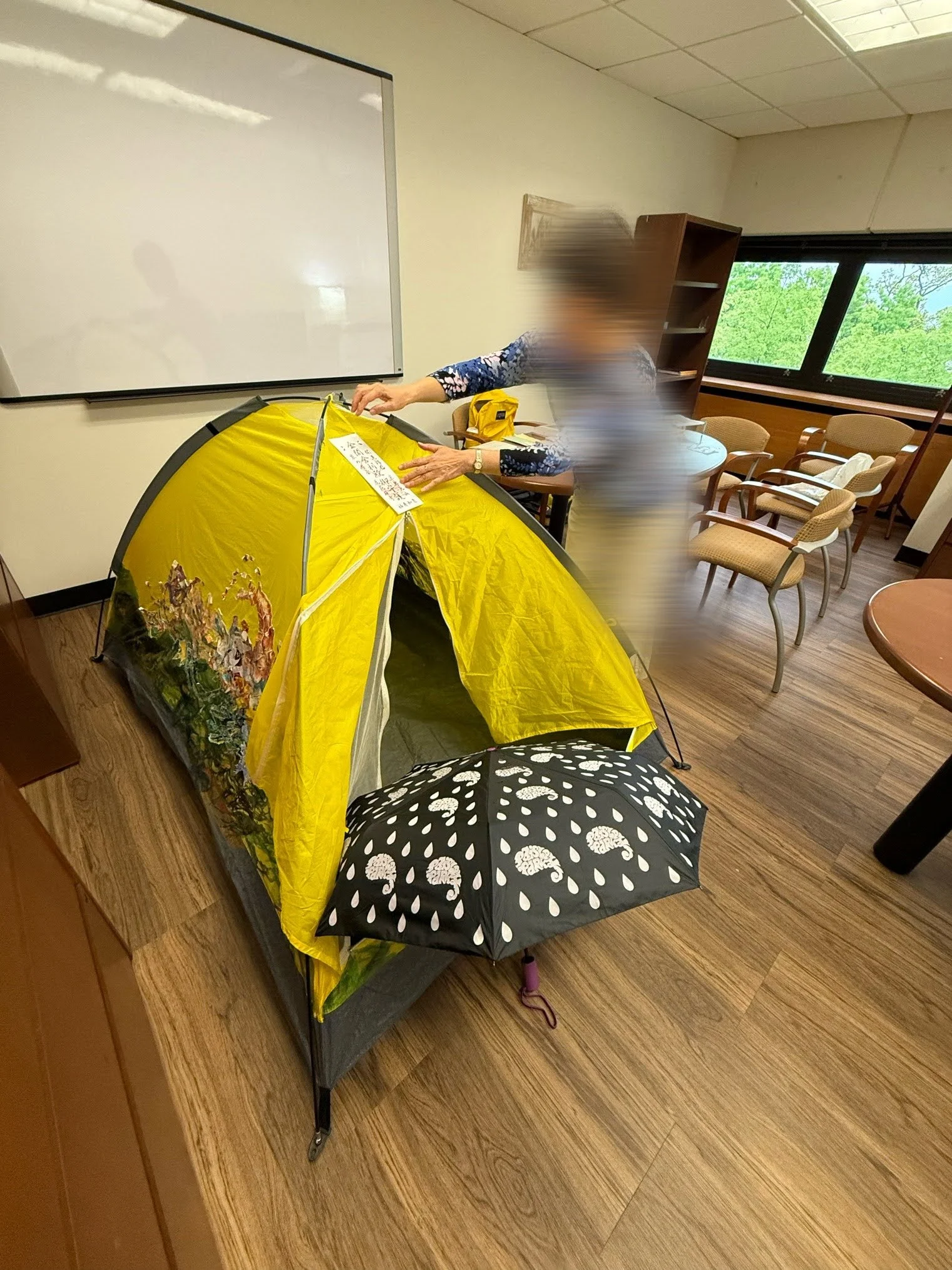
Not There, Not Here:
Holding Wabisabi, Daruma, and the Mask Within the Yellow Tent
On a rainy morning, I carried my yellow backpack and a small carry-on into an office where I prepared to set up the yellow tent for the first time in a professional setting. Shio, a Japanese immigrant leader in the United States, welcomed me and reflected on her transnational journey. Our dialogue unfolded around the symbolism of carrying luggage, the vulnerabilities of airport security, and her quiet mantra: “You can never scan my brain.” Inside the tent, objects such as a family photograph, omamori, daruma, tatami mat, mask, and umbrella transformed the office into a space of reclaiming tent/tension.
“when I go into the TSA machine, secretly, I’m saying to myself, you can never scan my brain.”
Rain fell in slow lines against the window as I stepped off the bus with a yellow backpack on my shoulders and a yellow carry-on at my feet. Inside the bag, the folded tent waited. Each step toward the office echoed with nervous energy. My hand trembled slightly as I pressed the elevator button. This was my first time preparing to unfold the yellow tent in a professional office, in dialogue with a participant who holds a leadership position. At the door, I stood silently for five minutes, counting the seconds before knocking.
When I entered, I placed the carry-on carefully by the frame and scanned the room, wondering whether the space could contain the yellow tent. Shio smiled warmly and remarked, “It is raining, I thought I may go to your place.” Her eyes fell on the bag, and our conversation began. She explained why she preferred carry-on luggage: it never left her side, unlike checked baggage that could be lost in systems of delay and miscommunication. “I have a tendency to want to hold on to things when it’s important, or at least I’m in control of the situation.” For her, the carry-on symbolized both burden and belonging, anchoring her across long flights.
The dialogue turned toward borders and security. She described the unease of entering the TSA scanner, a space where even documented travelers feel exposed. “Even though nothing is wrong with us, no criminal record, nothing done wrong… you never know. Even a speeding ticket can kick you out of this country.” I described the scanner as a ritual of nakedness. She responded softly, “When I go into the machine, secretly, I say to myself, you can never scan my brain.” The words resonated as quiet resistance, a reminder of agency that remains beyond surveillance.
When the yellow tent finally rose beside her desk, Shio circled its panels with curiosity. The color yellow opened a layered reflection. In the United States, yellow signified warning and danger, shaped by histories of racialized stereotypes. In her childhood in Japan, yellow meant sunlight and prosperity. Her mother once filled her life with yellow objects as symbols of hope. The tent held both registers, allowing fear and hope to coexist.
Shio spoke of her daily negotiation between languages. “Every day I wake up and I don’t even know if I’m thinking in Japanese or English.” Emails in English, LINE messages in Japanese—each mode shaped her interactions differently. She reflected on wabisabi, the Japanese aesthetic of silence and impermanence. “There is beauty in being silent,” she said, though silence in U.S. professional culture is often misread as weakness. “If I value wabisabi and really respect it, every day in this country I might be ignored.” As a leader in a field shaped by White, male expectations, she must prove linguistic fluency to be recognized, even when such performativity conflicts with her cultural values.
Objects assembled into a constellation of memory. A faded family photograph taken at a Shichi-Go-San celebration linked shrine rituals with the protective space of the tent. A white paper omamori from Kinkakuji promised protection, which she placed at the tent’s entrance with a laugh, “Then nobody can bother us.” At the center, she placed a red daruma, a gift from her father. With one painted eye, it symbolized resilience—fall down seven times, stand up eight. She had yet to paint the second eye despite completing her PhD, waiting until she felt ready inside.
She layered the daruma on a tatami mat with a cushion, blending Japanese tradition with American context. “Not hard, but not soft,” she said, describing tatami as a material of in-betweenness, mirroring her diasporic life. She added a KN95 mask above the daruma, recalling how it gave her protection during the pandemic, when she endured harassment in public spaces. A purple umbrella, changing color in the rain, offered another shield. “I like carrying an umbrella because it gives me emotional protection. Nobody can yell at me.”
Finally, she unfolded washi paper with handwritten Japanese characters, a letter to herself and her family. She read it aloud, translating her reflections: resilience requires more than strength or hard work—it requires attentiveness to beauty, an inheritance from her parents. Sitting inside the tent, she removed her shoes and laughed, “This almost feels like a secret tea ceremony.”
For two and a half hours, the office transformed. Objects and words gathered into a transnational narrative where vulnerability met resilience, and silence became strength. The yellow tent was no longer just mine—it became ours, a space where memory, culture, and care unfolded together
“Even though, you know, nothing wrong with us, you know, no criminal record, we haven't done anything wrong. But nowadays, you never know, even if you have the proper documentation. You know, we've heard some scary stories. Even a speeding ticket can kick you out of this country. Even American citizens can be sent out to a foreign country. And in this chaotic environment, naturally, people become more vigilant.”
“The longer you stay away from your home country, your identity becomes very complex. I still feel Japanese very much. But when I go back to Japan, I feel almost closer to being American. I just feel I'm not there, I'm not here, sort of, it's hard to find where my home is.”
“I almost want to attach this to here because then nobody can bother you.”
“If I value wabisabi and really respect it that way, every day in this country, I might be completely ignored. For example, if you go to a work meeting, first thing you do is make sure that people know that you speak English. It's silly, but if you already have a PhD, of course you can communicate.”
“Any happy occasion, families tend to go to shrine to celebrate”
“Yeah, don't reject yourself. Sometimes you fall off, but you kind of secretly stand up, right? People can kind of push you around”








